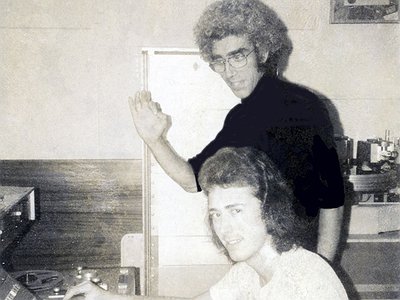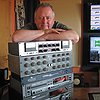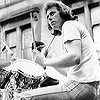What, to you, are the main goals of recording, editing and mastering? Do you, for example, feel it important that a recording is a reflection of reality or is it by default artifice and therefore subject to its own rules?
I don’t think a recording has to reflect reality. I think I’m more excited by something that doesn’t.
Recording, editing and mastering processes are not a set-in-stone. There are so many variables these days, which in some ways is a shame. A performance can be lost, because of the amount a recording can be changed. Pre 1980’s music was more honest, now anything can be done without competent origination; a shame.
Recording can be related to a particular location, but thanks to technology, it no longer has to be. How do you see the relation between sound, location and space?
As you say, you can record anywhere these days, and a lot originates from someone’s bedroom and small computer-based recording set-ups. This can be okay, but listening to something recorded with a real instrument, and the correct natural acoustics for that sound is far superior to any plug-in.
On the first day of my mastering career at IBC studios, I walked into the main studio where an orchestra were setting up for a session. I listened to a violin being played, and I’d never heard a real one before. I was amazed how wonderful it sounded, and that feeling has never left me. A lot of people don’t know what the real thing is, they need to get out there, listen, feel and drink it in; it makes a difference.
In how far are the objective, universal and measurable parameters for what constitutes quality in a recording? What are currently your main challenges and ambitions in terms of your approach to mastering to further these quality standards?
Quality is variable, and doesn’t need to conform to standards. A heavily distorted section of a recording can add intensity and colour. You can only achieve certain goals by ignoring the rulebook, and I go along with that.
The loudness war is one ‘quality’ area. I totally agree that a lot of today’s music is too compressed, and ruined by people who want everything louder than anything else; it’s a crazy situation.
But, at the same time, getting the right feeling to come across on a particular track when I’m mastering, demands me pushing it to the limit, and sometimes beyond. So it’s a difficult one. Having very limited dynamics is nothing new.
Look at the early Who singles, or some other releases from that period; they are as squashed as anything we have today. However, they have that impact and drive that wouldn’t be there if the rulebook was adhered to. Obviously I try to give my clients an end product that is perfect for them, I try to understand and supply what that project needs if it’s not already there in the mix, and they will hopefully be delighted, and come back to me for their next project.
Tell us about your studio, please. What were criteria when setting it up and how does this environment influence the creative process? How important, relatively speaking. are factors like mood, ergonomics, haptics and technology for you?
I spent many years working in windowless, air-conditioned mastering rooms in central London; it’s not always possible to achieve anything better in a built-up environment. These rooms varied from no acoustic treatment to finely tuned rooms with a lot of equipment. When I set up on my own in 1996, I converted a spare room in my house. I still needed good, quiet air conditioning, plus I installed my own acoustic treatment, and had good equipment allowing me to master to the standard my clients were used to. That was an amazing start to working for myself. From those windowless London rooms, I now mastered in a room with two windows, and natural light.
In 2002 I took everything a step further and moved to the Isle of Skye. I converted another room into my mastering studio, plus a large walk-in cupboard for a machine room to keep any noisy equipment away from the listening area. Again, I have natural light, but now I have fresh sea air coming in from the window instead of air-conditioning.
Again I installed my own acoustic treatment, and am very comfortable with how my room sounds. Okay, you can have wonderfully treated rooms, with amazingly accurate monitoring, but at the end of the day, the person buying the music is listening in a much poorer environment. I’ve got an honest sounding room, superb ATC 100A monitors, and they allow me to do a great job that sounds excellent on any system, large or small. I’m happy with that, and so are my clients.






